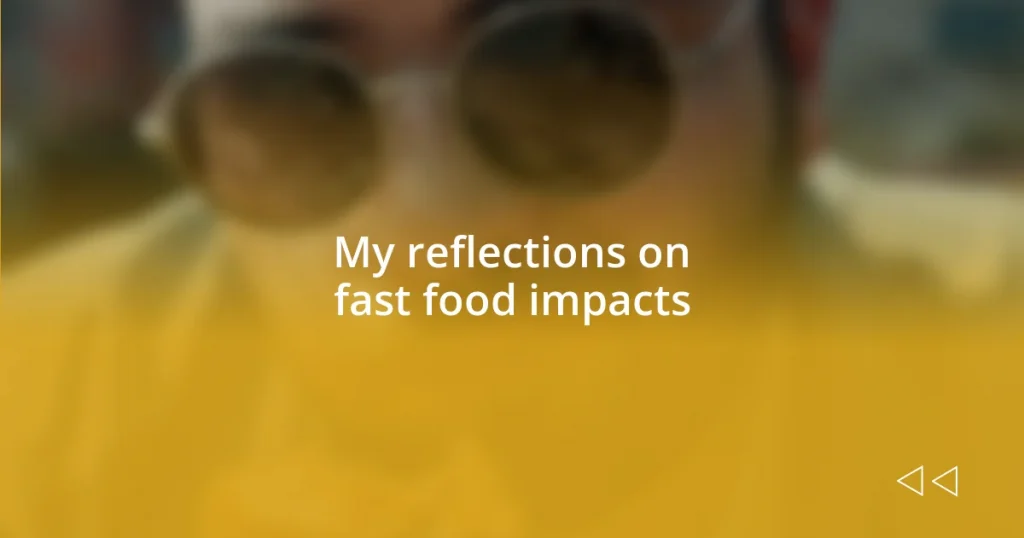Key takeaways:
- Responsible fast food practices emphasize sustainable sourcing, reducing waste, and transparency, positively impacting the environment and consumer trust.
- Sustainability in food supports local economies, promotes healthier choices, encourages ethical treatment of animals, and fosters community connections.
- Advocating for awareness around responsible fast food choices can inspire community engagement, leading to a broader cultural shift toward sustainable practices in dining.
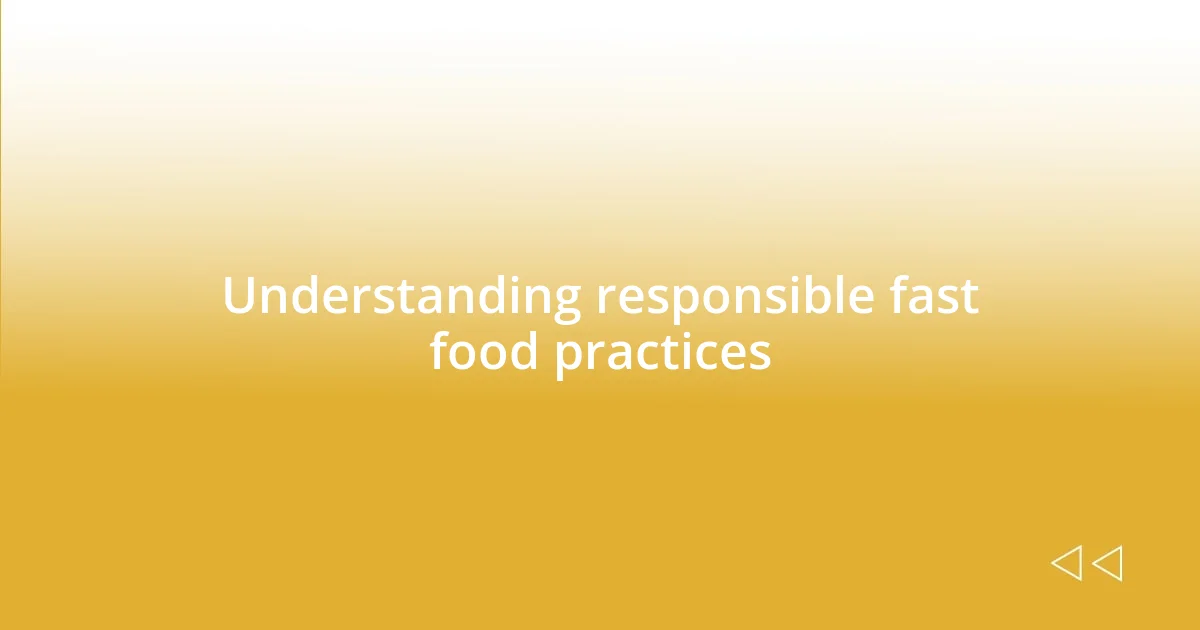
Understanding responsible fast food practices
Responsible fast food practices are essential in today’s world, where consumer awareness is growing. I’ve seen firsthand how many fast food chains are now prioritizing sustainable sourcing for their ingredients. It’s heartening to know that when we choose options made with organic produce or ethically raised livestock, we’re not just satisfying our cravings; we’re also supporting broader environmental goals.
Have you ever thought about the waste generated by fast food? I remember feeling overwhelmed after a drive-thru visit when I noticed the mountains of packaging waste. This experience made me realize that responsible fast food practices include reducing single-use plastics and finding innovative ways to minimize waste. Brands that embrace eco-friendly packaging not only make a positive impact but also send a compelling message about caring for our planet.
Transparency plays a huge role in responsible practices as well. I often feel more connected to a brand when I know where my food comes from. When fast food chains clearly communicate their sourcing and ingredient practices, it builds trust. Isn’t it reassuring to know that the meal you’re enjoying was produced with integrity, all while satisfying your taste buds?
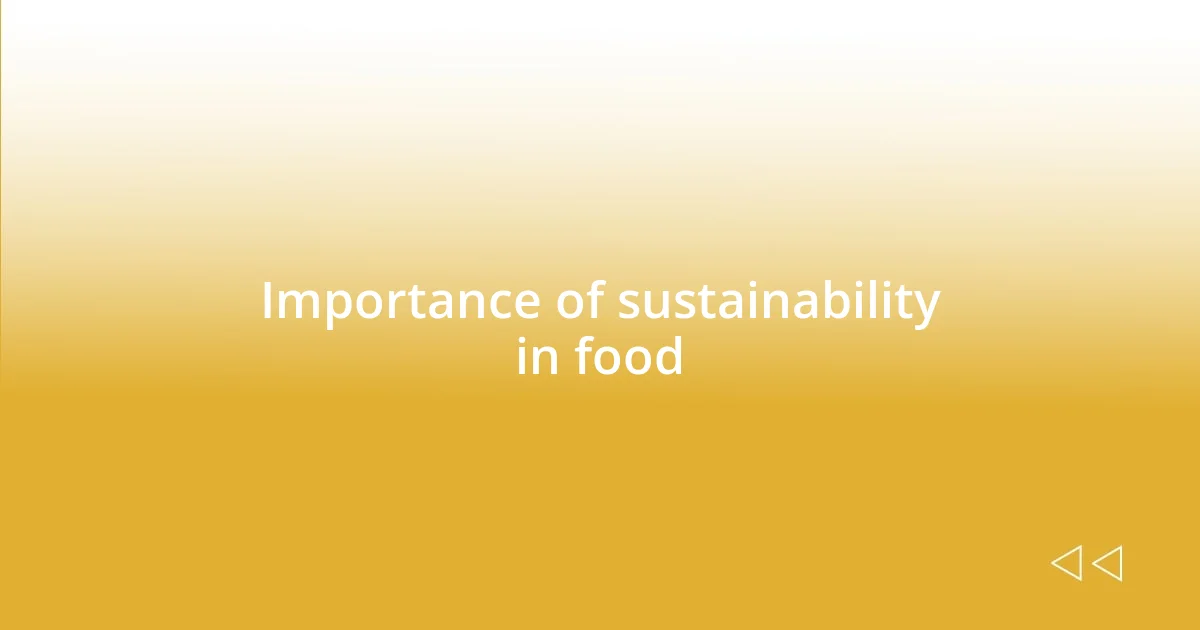
Importance of sustainability in food
Sustainability in food isn’t just a trend; it’s a necessary shift toward protecting our planet for future generations. I often find myself reflecting on the consequences of our food choices. It’s startling to realize that food production contributes significantly to environmental issues like deforestation and climate change. Each time I choose options that prioritize sustainable practices, I feel like I’m playing a small but meaningful role in the larger picture.
Here are some key reasons why sustainability in food matters:
- Reduces environmental impact: Sustainable agriculture practices can help conserve water, reduce emissions, and protect biodiversity.
- Supports local economies: Sourcing food from local farms stimulates the economy and reduces the carbon footprint associated with transportation.
- Promotes healthier choices: Sustainable food often means fresher, more nutritious options, which directly benefits our health.
- Encourages ethical treatment of animals: Prioritizing humane farming practices leads to better quality of life for livestock.
- Fosters community connections: Engaging with local food systems strengthens our ties to the community and increases awareness of our food sources.
Thinking back to the times I visited farmers’ markets, I felt a unique connection to the people growing my food. It’s a stark contrast to the faceless production lines of industrial agriculture. Each purchase felt like a vote for practices that honor both nature and the individuals supporting it.
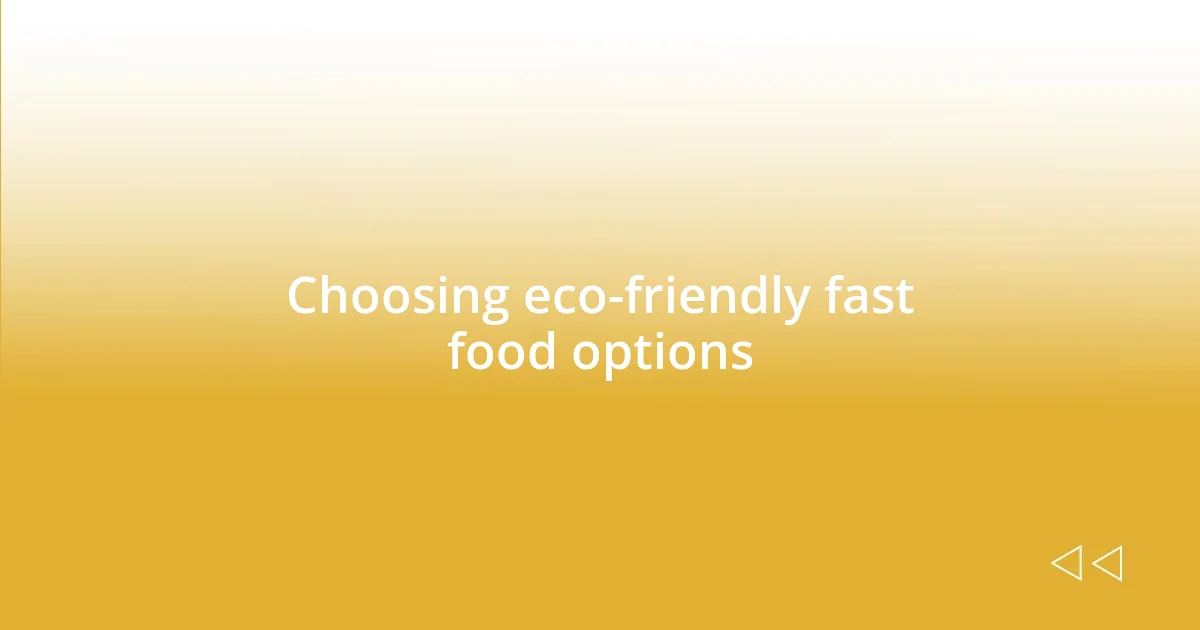
Choosing eco-friendly fast food options
When it comes to choosing eco-friendly fast food options, I’ve found that it’s all about being mindful of both the ingredients and the packaging. For instance, I often opt for restaurants that serve meals with locally sourced produce. This not only supports farmers in my area but also significantly reduces the carbon footprint associated with transporting ingredients. It’s a small change that makes me feel connected to my community and the environment.
I also pay close attention to the packaging used by fast food places. Just the other day, I noticed a popular chain switching to biodegradable containers. This shift impresses me because it addresses my concern about plastic waste. Engaging with brands that prioritize eco-friendly materials gives me a sense of empowerment. I feel like I’m actively choosing a sustainable future each time I make that decision.
It’s fascinating to compare the different eco-friendly initiatives brands are embracing. To further illustrate this, I’ve created a comparison table with some fast food options and their sustainable practices. This visual can help guide our choices based on what matters to us when we dine out.
| Fast Food Chain | Sustainable Practices |
|---|---|
| Chain A | Locally sourced ingredients, biodegradable packaging |
| Chain B | Grass-fed beef, partnership with local farms |
| Chain C | 100% recyclable containers, vegetarian options |
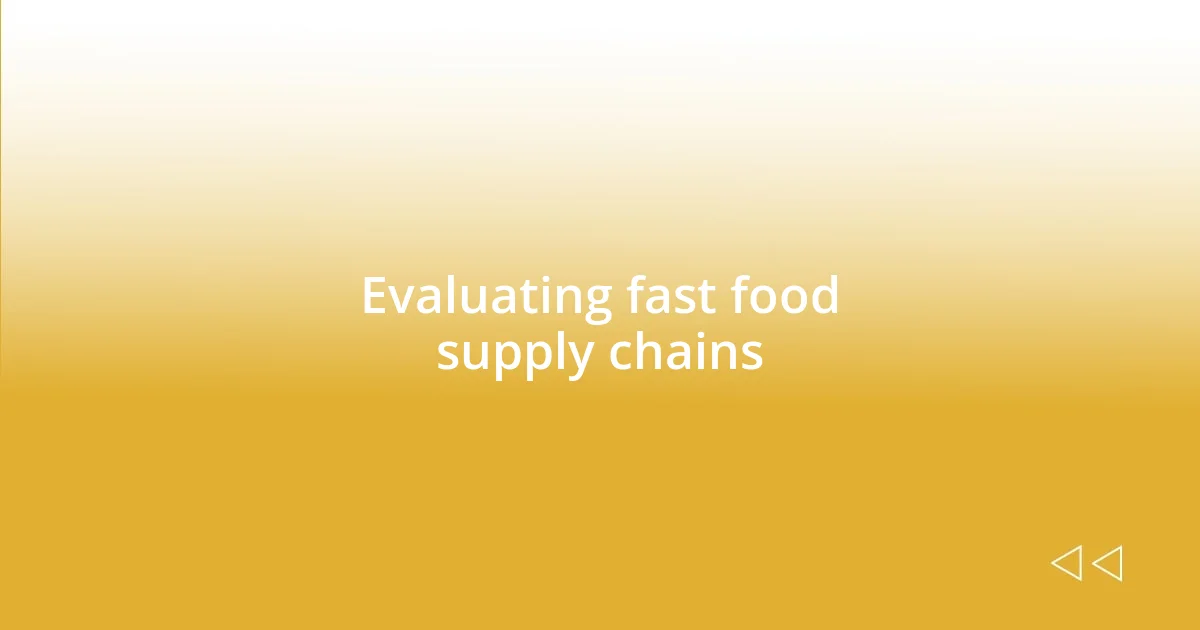
Evaluating fast food supply chains
Evaluating fast food supply chains can feel overwhelming at first, but I like to break it down into manageable components. When I consider a chain’s supply chain, I think about where the ingredients come from and the ethical practices behind their sourcing. For example, I often ask myself: “Are the farmers treated fairly? Is the food processed responsibly?” These questions have led me to make more informed choices, emphasizing transparency and accountability.
I recall a recent experience at a local fast-food joint that partnered with nearby farms. As I bit into my burger, I couldn’t shake the feeling of satisfaction knowing that my meal supported local agriculture. It’s empowering to participate in a system that not only champions sustainability but also invests back into my community. This connection adds layers of meaning to my dining experience – it’s more than just food; it’s an act of supporting a cycle of responsible practices.
Moreover, I find it enlightening to explore how fast food chains are evolving. Some are beginning to disclose their sourcing practices publicly, and that transparency inspires trust. I often think about how this shift reflects a broader societal change, pushing consumers and companies to be more accountable. It makes me wonder: what will the future of fast food look like if more chains prioritize ethical sourcing and sustainability?
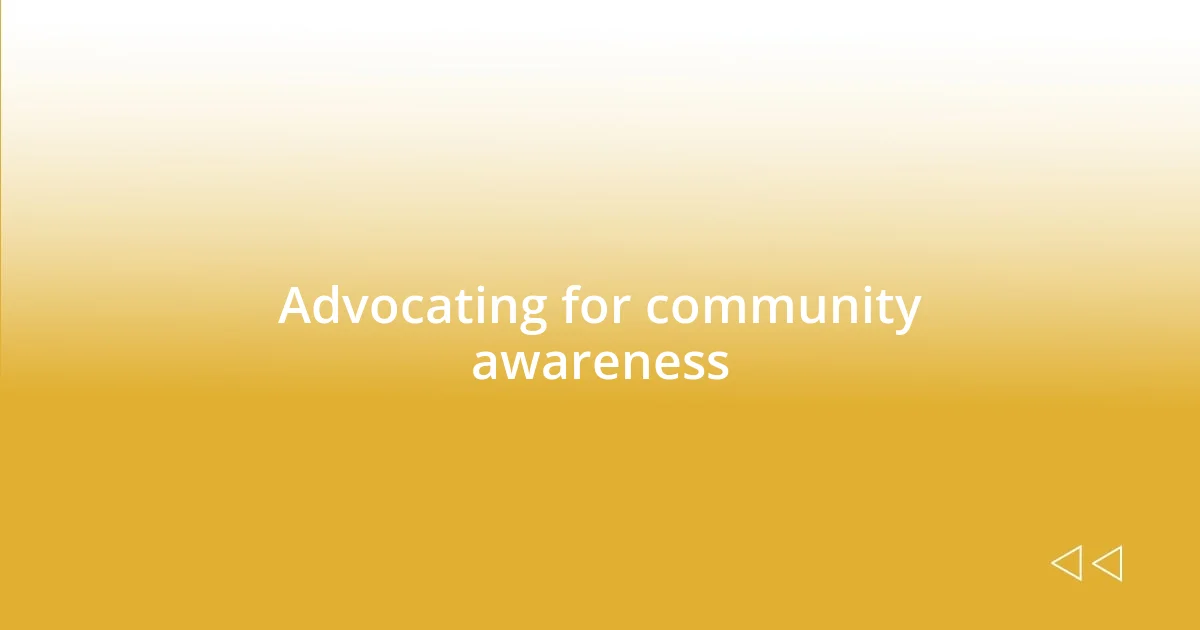
Advocating for community awareness
Advocating for community awareness around responsible fast food practices is something I genuinely care about and actively participate in. I often attend local farmer’s markets, and I can’t tell you how inspiring it is to hear vendors talk about their sustainable farming methods. It gets me thinking: if consumers like me engage more with these producers, how much more could we boost awareness about the implications of our fast food choices? Connecting with the community can spur conversations that challenge the status quo.
Once, while dining with friends at a local eatery, I shared some insights about the sourcing of our meals. As I explained how my awareness of the origins of our food changed my dining habits, I saw their expressions light up with curiosity. It prompted them to ask questions about what made certain ingredients better for the environment. In that moment, I realized how vital it is to advocate for awareness—every conversation can open the door to new perspectives and responsible choices.
I frequently engage in online forums and community discussions surrounding fast food practices. I remember a compelling debate about the impacts of excessive plastic use in our food packaging, which really struck a chord with me. How many times have we ordered food and mindlessly discarded the packaging? Through these discussions, I understand the importance of raising awareness that pushes for change. It empowers others to think critically about their choices, creating a ripple effect in promoting responsible practices together.
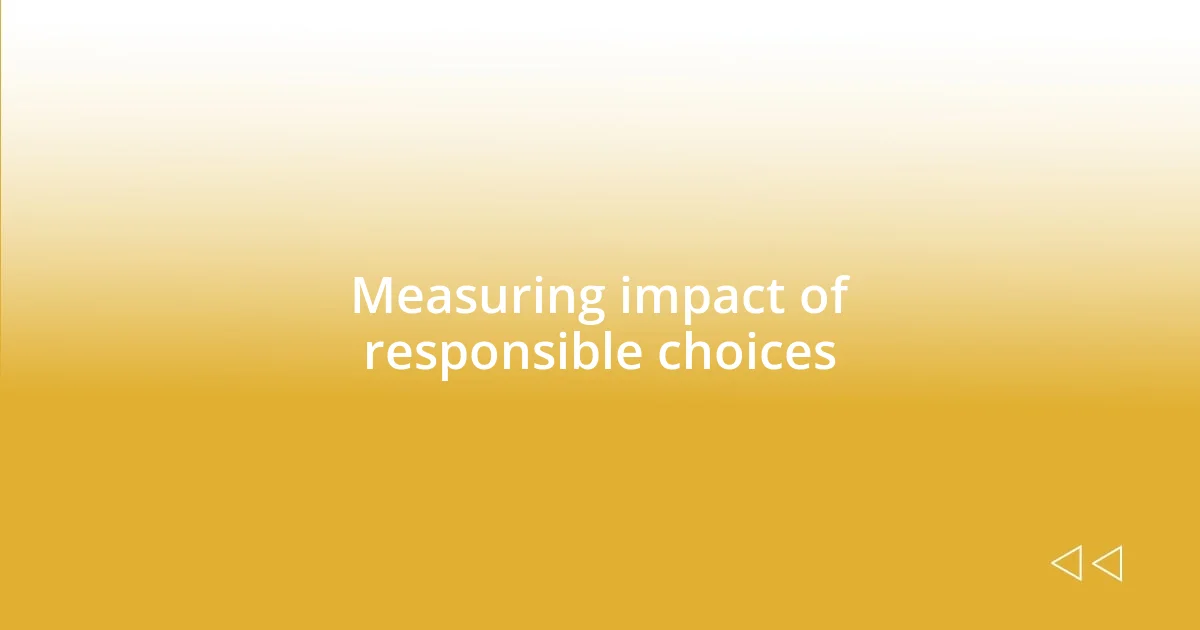
Measuring impact of responsible choices
Measuring the impact of responsible choices can be a rewarding experience, especially when I think about the direct consequences of my actions. For instance, when I choose a fast-food option that uses cage-free eggs, the sense of contributing to better animal welfare adds a weight of satisfaction to each bite. Reflecting on these choices makes me wonder: What if everyone made even small adjustments? The cumulative effect could be monumental.
I often catch myself tracking the changes in my community as more people express interest in sustainable fast food options. It’s fascinating to witness how local eateries responding to customer demands can pivot their sourcing practices, which ultimately benefits the environment. I sometimes compare it to a ripple effect; one choice influences another, and before long, it feels like I’m part of a larger movement toward positive change. Isn’t it incredible to think that we, as consumers, hold the power to shape these practices?
Additionally, I try to quantify my personal impact by keeping tabs on my dining habits over time. By using a simple journal to record the responsible decisions I’ve made, I not only track my progress but also see how these choices resonate in my life. There were moments when I realized that by sharing these insights with friends, they began to make similar choices too. It’s amazing how one person’s journey can inspire another—perhaps it’s time we all become more deliberate in measuring the impact of our responsible choices.















